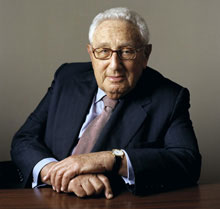
“The art of the statesman,” Henry Kissinger, former Secretary of State and Nobel Peace Prize recipient, explained, is to operate at the upper limit of a country’s values and convictions. “If you go past that point, you will crash; if you don’t reach that point, you will stagnate.”
Kissinger’s remarks were part of a talk, moderated by University President Rick Levin and Robert Lovett Professor of Military and Naval History John Gaddis, which touched upon Diplomacy—his treatise on American foreign policy—along with his views on scholarship and current events in the world. The talk was held in the McNeil Auditorium of the Yale Art Gallery in front of approximately 300 invited professors and students, and was the opening for the second annual conference hosted by the Johnson Center for the Study of American Diplomacy. The Johnson Center is a program of the Jackson Institute for Global Affairs, in collaboration with International Security Studies and the Brady-Johnson Program in Grand Strategy.
Over the course his talk, Kissinger moved from abstract discussions of scholarship and theory to his views on current crises in the world. The first topic concerned the relationship between the study of foreign policy history and the practicalities of implementing it—two topics that were explored in great depth in Diplomacy.
“In many ways, history is the only laboratory for foreign policy,” Kissinger said. “By studying history, you can look at comparable situations that other societies have faced, and learn from their experience.” The difficulty, according to him, is that it is hard to identify what situations are comparable. “As a child, you know that a hot stove burns, but you still need to recognize it as a hot stove,” he explained.
In response to a question from an audience member, Kissinger explained that his views were shaped less by international relations theory—which he rejected as very abstract and difficult to apply—and more by the philosophy of history. He identified Machiavelli and Clausewitz as influential writers for him; people who gave him a sense of the “nature of historical change and how to effect it.”
One of Kissinger’s greatest accomplishments was opening up China during the 1972 summit, which formalized relations between the two countries. He urged current policymakers to carefully walk the line between conviction and pragmatism in pushing one of the biggest concerns in international politics—the issue of human rights in China.
“Groups that have a strong human rights conviction have every right, and perhaps obligation, to express their views,” he said. “But they should be humble and realize that human rights is not the entire story. There are other considerations, such as how to continue the trajectory of cooperation with a country with one billion people that happens to be a leader in global politics.” A conflict between China and the U.S., he added, would be much more catastrophic than World War I.
On Syria, Kissinger advocated for the United States to avoid military intervention and start talks with Russia about a desirable outcome—one that addressed Russia’s biggest concern that radical elements in Syria would spread to its own country. On Europe, he urged the Union to focus more on political integration over the next few decades, and work on economic integration in smaller, more workable groups. On North Korea, he insisted that there was no real threat of all-out war, and for the Obama Administration to tone down the hysteria that has engulfed the headlines for the past few days.
“The real danger is when the regime collapses—which is inevitable—what’s going to happen?” he said. “South Korea may move; China may move; and the U.S. may be forced to move. We’re going to get ourselves in a classic situation where a local incident turns into an international crisis.” To prevent such a crisis from developing, the U.S. should already be in private talks with China to negotiate a deal, he argued.
